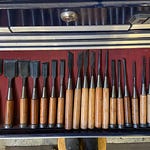Jason the Hare from Overhill Underdale (I presume) writes,
“Without beating around the bush, you were the gateway drug for me into many incredible writers such as (first and foremost) Wendell Berry, Michael Pollan, and James Rebanks. I do have a question for you: What do you think are the benefits in having and tending to your own garden?”
and
Boaz from Squirrel Hill, located in Pittsburgh, Pennsylvania writes,
“We crossed paths once on a cheese-related project and I wanted to check in with a question. I know that you're passionate about nature and the outdoors. Are you also a gardener? If so, what's in your garden? ”
Thank you very kindly, Jason the Hare and Boaz, for tapping into a favorite topic of mine with your questions, and the short answer is simply: strawberries. And sweet corn.
Boaz, a bonus thanks again for your gentle chaperoning when you guided me through that veritable Wonderland of Wisconsin cheeses, as well as a rousing canon of that inimitable refrain: “We’re just Cheesin’ around.” I hope to meet you there again soon, and you will know me, not by my fruits, but by the curds. I mean, I’ll be standing by the curds.
Gardening! This word hits me like Chocolate! or Vicodin! or Nickelback! might hit some others. My last book, Where the Deer and the Antelope Play, is more or less entirely about the answer to this question, and the spirit behind that answer. So, I guess, go read it? You can also listen to me read it to you as an audio book, if you’re too tuckered out to lift those hinged paper pages over and over again, and if that’s the case, hey, I get it. Shit’s a lot right now.
For those of you who want to just stick to this condensed Substack version, I get that, too. Let me see if I can succinctly nutshell it for you.
I grew up in a large family in rural Illinois, with more than one avid gardener to be found among our numbers: the grain & (early on) hog farmers (8), nurses (2), school teachers (4), librarians (3), paramedic/firemen (2) and one craft beer purveyor (1). Of the gardening households in our clan, my parents’ home place is the one of which I have had the clearest, most consistent view over the last fifty years.
The care with which my parents have nurtured the plants in their lives, from the prodigious produce of their annual garden, to the well-populated platoons of flowers paraded around the yard and buildings, to the shrubs, bushes and trees framing in the well-tended grass lawn at the foot of the whole shebang, is commensurate with the affection they apply to their family members, their neighbors, and damn near everybody else they come across, even fans of the St. Louis Cardinals.
Wheelbarrowing through a childhood that bore witness to, and was a greedy recipient of, their talent for tending to things, I was handed an unfair head start in the realm of self-sufficiency. My siblings and I were made to pull weeds in the garden, and you can bet your favorite crypto decoder ring that we hated it. Regardless of our feelings about the matter, we learned, at least temporarily, that with patience and honest labor, amazing results can be achieved with damn low overhead costs. For the price of some seeds and some vigilance, why you could end up with a watermelon. Or several watermelons.
Of course, when such an educational advantage is unearned, it doesn’t necessarily take root in a deep and lasting way, as though ‘twere a seed that fell upon the rocky soil, to make a figure of speech. To wit, although I did retain many of Mom and Dad’s simple, prudent life lessons (I could always tie my shoes in less than three tries), I managed to miss or forget enough of their tutelage that I became something of a blind simpleton of a consumer in my twenties, happily purchasing what life I could afford, ignorantly glad just to have a cheeseburger, a six-pack and a tank of gas, with nary a thought of gardening.
Thankfully, like a dandelion that you think has been successfully plucked from your yard (and foolishly, too—those flowers are lovely, edible, and beneficial to insect and soil life), the deep taproot remnant of my parents’ teaching apparently remained intact, because it vigorously blossomed forth once it was re-awakened by the life-giving succor of agrarian writers like those mentioned above.
I was simply presented with the question: “Do you know who produces your food, where, and how?”, and I was perfectly flummoxed to realize that I generally, overwhelmingly, had no idea. What a truly insane circumstance, to be entirely in the dark about from where any of my sustenance came. Or I guess I should say “in the dark” ever since I flew Mom and Dad’s coop and left behind their bountiful garden and freezer full of goodness, not to mention the excellent bratwursts we’d get once a year from Lou Verchimak, and Uncle Terry’s bottomless venison contributions. I mean, he hunted in pants, I’m just saying he provided a large amount of deer meat.
It made me upset with myself, and all of us in our modern society who have lazily allowed corporations to sink their talons so deeply into the health of our food, our bodies, our plants and animals, and our ecosystem. Food, the literal bread of life, is something I just don’t think should be produced at a lesser quality, i.e. with less nutritional value, or containing ingredients that are known to be harmful to us, for increased profit.
Before I sidetrack myself into a rant on the many evils of industrial farming, let me just summarize the topic with the notion that industrial profits require an ever-growing supply of materials, and when those materials include healthy water, soil, micro-organisms, etc., then the “farmer” is faced with a challenge: either adjust the volume of production so that the natural resources of a place can continue to renew themselves year after year, aka working in concert with Mother Nature, aka agrarian thought. If she or he wants to create an ample harvest year after year, then said farmer must pay attention to the needs of all the inhabitants of her or his land. By this metric, we can deduce that proper farming and gardening can actually nurture empathy, among other crops.
Or the farmer can force his or her desires upon the local biosphere, destructively extracting what it is that they require to meet their profit margins, aka cold capitalism. Instead of emulating nature, our factory farmers ignore the needs of the ecosystem and use chemicals instead to poison the bugs and the other “bad” plants, to replace the micro-organic life that they have long since obliterated from the once loamy topsoil. And these are just the intentional “benefits”, never mind the poisoned watersheds and despoiled habitats. Ok, cutting myself off. Of course this is all powerfully simplified for brevity. Everybody needs to make a living and it’s extremely hard to farm in the ideal way I’ve suggested and still make a profit. The conversation deserves a great deal more focus and nuance.
Part of the rancor I feel around this subject matter is my own complicity in this vast system. Just like we’re all complicit in the cogs of society’s machinery that are responsible for climate change, largely due to our dependence on fossil fuels. Ever since this dilemma first slapped me across my chewin’-hole, I have done my best to promote writing concerned with the anti-industrial, localized agriculture sensibility, and turn my readers on to the idea that, as Wendell Berry famously tells us, “Eating is an agricultural act.”
Therefore, as far as I’m concerned, growing one’s own garden is a quiet, pastoral, radical act of defiance in the face of materialistic conformity. When you grow anything for yourself, be it vegetables, fruit, herbs, or comestibles beyond the conventional garden, like the fresh eggs of laying hens, bacon and ham from hogs raised under acorn oaks, or grass-fed beef from rotationally grazed cows (meat gardens), you are maintaining, as a singular member of homo sapiens, our ancient connection to the rhythms and ceremonies of Mother Nature’s economy.
If you think that sounds a tad too much like I got a Bachelor of Fine Arts, consider it this way: a meal made with tomatoes that you have grown yourself is a way to serve your family, not only sustenance, but integrity. You aren’t left wondering what the words on the grocery store label mean, like “organic”, “all-natural”, “100% organic”, “heart healthy”, etc. The variety of obfuscating words that are legally allowed to describe eggs in the store is like a comedy sketch. I repeat—is it really too much to ask our United States Food and Drug Administration and our Department of Agriculture to at least prohibit the use of outright bullshit on our food labels? If you grow your own food, it’s bullshit free. Depending on your source of fertilizer, that is.
I’m going to wrap it up by steering everyone to the writers mentioned above, and I’ll go a step further by offering specific titles: I’m always hard-pressed to choose between my many favorite works by Wendell Berry, but The Unsettling of America is kind of the Rubber Soul of agrarian screeds for me. It’s also one of the books that floated Michael Pollan’s boat, and inspired a lot of his early work. His Pet Sounds in this groovy analogy would be his masterpiece (to date), The Omnivore’s Dilemma, but I would actually start you off with The Botany of Desire, since we’re talking about the inescapable, eternal romance between humans and plants. You should simply read all the books by James Rebanks because of their inspired bucolic excellence, but I’d also recommend a book he told me to read by another writer I adore, John McPhee, and that is Giving Good Weight. I’m also besotted with Robin Wall Kimmerer and her beautiful writing in Braiding Sweetgrass, and Gathering Moss, and perhaps the greenest of the green thumbs, fecund to none, Aldo Leopold and his seminal text, A Sand County Almanac.
And Boaz, after all this you might be surprised to hear that I have not had a garden of my own since I grew a bunch of basil a while ago and made a shitload of pesto (fresh pesto—highly recommended), for a couple of reasons. Number one: because of the aforementioned years in which I was just a jackass and it never would have occurred to me. Number two is that since I got my head (at least partially) out of my ass, I’ve been on the road most of the year, or working insane hours even while in LA, so I’ve always said I didn’t want to have a garden in which someone else would have to do all the work.
I love the varied and bounteous farmer’s markets of LA, and the amazing farm/ocean-to-table restaurant scene. Dad even still sends me some of his garlic from Illinois, and I have an amazing neighbor named Adam who is a talented and consistent gardener. I do make occasional offerings to his compost bin, and I help harvest the lemons from his tree, as well as figs, peppers, rosemary and mint, so if you squint real hard, you might see a gardener in me.
But I am bursting at the peapod to inform you that, as of this writing, we’re finally installing planter beds at our house, no doubt the result of the pandemic stagnancy many of us experienced keeping me home. We live on a hill, so it will require some terracing, but I’m powerfully chuffed at the idea of producing some grub of integrity in the hills of Los Angeles. I’m also jonesing for some chickens, so I can generate my own egg supply, but we live above a canyon that has a number of coyotes on the prowl, and we have small dogs as well, so I’m still just doing a lot of strategizing about how to pull that off.
I’ll end earnestly by saying that, while not all of us can be gardeners or charismatic, low-acreage, artisanal farmers, what we can do is understand why those people are so important to our society in every way. This understanding must be powerful enough to encompass not only the health of our foodstuffs, but the subsequent well-being of our people, our habitats, and ultimately our entire planet and beyond.
If you ever get to see my folks sit down to lunch with items from their garden—Mom with some cottage cheese, raw cucumber and a little salt, Dad slicing a sun-warm tomato onto a turkey sandwich, and then see the look on their faces when they taste what they have produced, well, you won’t need to read this essay. I guess I should have said that first.
Love,
Fellow Muleteers, I hope you’re enjoying this project half as much as I am. Please continue to ask me questions in the comments, and be sure to tell me where you’re from if you feel like it. Soon enough, a dreaded paywall will be erected, and unlike that flaccid effort on the part of our former president, I fear this one will actually go up.
Once that happens, paid subscribers will get the bonus good stuff, like audio versions and the ability to ask questions, and maybe some short claymation talkies, which actually sounds pretty optimistic now that I’ve typed it out. I’m sure it’ll be terrific back there, but rest assured the print version will always be free.


























Share this post